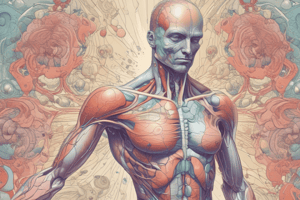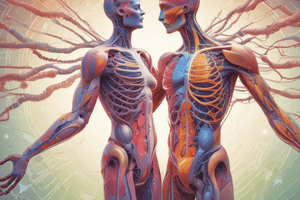Podcast
Questions and Answers
What is the primary function of hematopoietic stem cells?
What is the primary function of hematopoietic stem cells?
- To produce only lymphoid cells
- To produce only myeloid cells
- To give rise to all blood cells (correct)
- To produce only granulocytes
Which of the following cells are classified as agranulocytes?
Which of the following cells are classified as agranulocytes?
- Lymphocytes and monocytes (correct)
- Eosinophil and basophil
- Granulocytes and megakaryocytes
- Macrophage and neutrophil
What is the difference between myeloid progenitors and lymphoid progenitors?
What is the difference between myeloid progenitors and lymphoid progenitors?
- Myeloid progenitors produce only erythrocytes, while lymphoid progenitors produce only platelets
- Myeloid progenitors produce granulocytes, macrophages, and monocytes, while lymphoid progenitors produce lymphocytes (correct)
- Myeloid progenitors produce only granulocytes, while lymphoid progenitors produce only lymphocytes
- Myeloid progenitors produce only macrophages, while lymphoid progenitors produce only NK cells
What is the function of the mononuclear phagocyte system?
What is the function of the mononuclear phagocyte system?
What is the name of the stem cell that can self-renew and commit to a progenitor cell?
What is the name of the stem cell that can self-renew and commit to a progenitor cell?
What is the role of the lymphatic system in the immune response?
What is the role of the lymphatic system in the immune response?
Where do lymphocytes mature and develop?
Where do lymphocytes mature and develop?
What is the process by which blood cells are produced?
What is the process by which blood cells are produced?
What is the function of the thymus gland?
What is the function of the thymus gland?
Which of the following is a characteristic of hematopoietic stem cells?
Which of the following is a characteristic of hematopoietic stem cells?
What is apoptosis?
What is apoptosis?
Which region of the lymph node is primarily responsible for the activation of T cells?
Which region of the lymph node is primarily responsible for the activation of T cells?
What is the primary function of the spleen?
What is the primary function of the spleen?
What is the term for the organized areas of lymphoid tissue along the digestive, respiratory, and urogenital tracts?
What is the term for the organized areas of lymphoid tissue along the digestive, respiratory, and urogenital tracts?
What type of cell is responsible for directly transferring pathogens across the mucosa?
What type of cell is responsible for directly transferring pathogens across the mucosa?
Which region of the lymph node is primarily responsible for the production of plasma cells and memory cells?
Which region of the lymph node is primarily responsible for the production of plasma cells and memory cells?
What is the term for the area of the spleen where antigens meet antigen-presenting cells (APCs)?
What is the term for the area of the spleen where antigens meet antigen-presenting cells (APCs)?
What is the minimum molecular size required for a molecule to be considered immunogenic?
What is the minimum molecular size required for a molecule to be considered immunogenic?
What is the primary factor that determines the degree of foreignness of an antigen?
What is the primary factor that determines the degree of foreignness of an antigen?
Which of the following is NOT a characteristic of a hapten?
Which of the following is NOT a characteristic of a hapten?
What is the role of adjuvants in immunogenicity?
What is the role of adjuvants in immunogenicity?
What is the primary factor that determines the route of administration for an antigen?
What is the primary factor that determines the route of administration for an antigen?
What is the result of administering a low dose of an antigen?
What is the result of administering a low dose of an antigen?
What is the role of the host's genotype in immunogenicity?
What is the role of the host's genotype in immunogenicity?
Flashcards are hidden until you start studying
Study Notes
Body Compartments that Participate in the Immune System
- The bloodstream, mononuclear phagocyte system, and lymphatic system are the three body compartments that participate in the immune system.
Hematopoiesis
- Hematopoiesis is the production of blood cells.
- All blood cells arise from Hematopoietic Stem Cells (HSC).
- HSCs are the 'mother' of all blood cells and can self-renew.
- HSCs can differentiate into two main types of cells: myeloid and lymphoid progenitors.
- Myeloid progenitors can differentiate into granulocytes, macrophages, monocytes, erythrocytes, megakaryocytes, eosinophils, and basophils.
- Lymphoid progenitors can differentiate into lymphocytes and natural killer (NK) cells.
Hematopoietic Homeostasis
- Erythrocytes have an average life span of 120 days and are phagocytosed by macrophages in the spleen.
- White Blood Cells (WBCs) have a life span of 1 day to 20-30 years.
- Apoptosis is a programmed cell death that contributes to hematopoietic homeostasis.
Mononuclear Phagocyte System
- The mononuclear phagocyte system is a network of connective tissue fibers and cells surrounding organs.
- It is inhabited by phagocytic cells that are ready to attack and ingest microbes that have passed the first line of defense.
Lymphatic System
- The lymphatic system provides an auxiliary route for the return of extracellular fluid to the circulatory system.
- It acts as a drain-off system for the inflammatory response.
- It renders surveillance, recognition, and protection against foreign material.
Lymphoid Tissues and Organs
- Lymphoid tissues and organs can be classified into primary and secondary lymphoid organs.
- Primary lymphoid organs are responsible for the development and maturation of lymphocytes, whereas secondary lymphoid organs are responsible for the activation of mature lymphocytes.
Primary Lymphoid Organs
- The thymus is a primary lymphoid organ responsible for T cell development and maturation.
- It induces the death of T cells that cannot recognize self-MHC molecules or interact with MHC molecules too strongly.
Secondary Lymphoid Organs
- Secondary lymphoid organs include spleen, lymph nodes, tonsils, appendix, and mucosa-associated lymphoid tissue (MALT).
- Lymph nodes are responsible for filtering lymph, activating lymphocytes, and producing plasma cells and antibodies.
- The spleen is a lymphoid organ in the upper left abdomen that filters blood, activates lymphocytes, and produces plasma cells and antibodies.
- MALT is a organized area along the digestive, respiratory, and urogenital tracts that is responsible for immune response to pathogens.
Host and Antigen Factors in Immunogenicity
- Host factors that influence immunogenicity include genotype, dosage, and administration of the antigen.
- Antigen factors that influence immunogenicity include foreignness, molecular size, chemical composition, and the presence of adjuvants.
Innate vs. Adaptive Immunity
- Innate immunity is non-specific, pre-existing, and responsive to a wide range of pathogens.
- Adaptive immunity is specific, responsive, and acquired through exposure to pathogens.
Studying That Suits You
Use AI to generate personalized quizzes and flashcards to suit your learning preferences.





